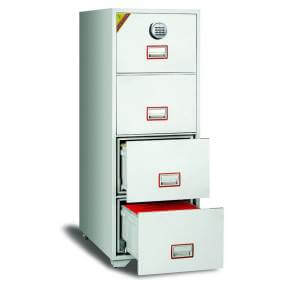Determining which documents deserve the protection of a file cabinet safe requires understanding the devastating consequences of losing certain paperwork versus the inconvenience of restricted access. Your file cabinet safe should house documents that would be expensive, time-consuming, or impossible to replace, while remaining accessible enough for practical use. The key lies in identifying papers that represent your legal identity, financial foundation, and irreplaceable personal history. Making smart choices about what to store will maximize your safe's effectiveness while ensuring you don't create unnecessary barriers to documents you need regularly.
Identity and legal documents form the foundation of your secure document strategy, as losing these can trigger cascading problems across every aspect of your life. Birth certificates, Social Security cards, passports, and naturalization papers should always occupy prime real estate in your safe, as these documents prove your very existence in legal and financial systems. Marriage certificates, divorce decrees, adoption papers, and death certificates of family members create your legal family structure and often cannot be quickly replaced when needed for inheritance, benefits, or legal proceedings. Military discharge papers, professional licenses, and educational diplomas represent achievements and qualifications that may require months to verify and replace. Keep originals of these documents in your safe while maintaining certified copies in easily accessible locations for routine needs.
Property ownership documents deserve secure storage because they represent substantial financial investments and can be complex to reconstruct if lost. House deeds, property surveys, and title insurance policies prove ownership of what may be your largest asset, while mortgage documents outline your ongoing obligations and rights. Vehicle titles for cars, boats, motorcycles, and recreational vehicles should be secured, as replacing them involves state bureaucracy and potential complications if liens exist. Important contracts such as business partnership agreements, employment contracts with non-compete clauses, and significant purchase agreements create binding obligations that you may need to reference or enforce years later. Land records, easement agreements, and homeowners association documents can become crucial during property disputes or sale negotiations.
Financial documents requiring safe storage differ from routine banking paperwork by representing long-term commitments, significant values, or difficult-to-replace account information. Tax returns from recent years should be secured, particularly if they contain business information, substantial deductions, or could trigger future audits. Investment account statements showing significant holdings, stock certificates for closely-held companies, and documentation of retirement accounts protect your financial future. Insurance policies for life, disability, and major property coverage need secure storage, as these contracts may be needed by beneficiaries during emotional crises when careful searching isn't possible. Loan documents for significant debts, credit agreements with personal guarantees, and bankruptcy paperwork create legal obligations that extend for years beyond their signing.
Personal and family historical documents hold irreplaceable sentimental and practical value that makes them prime candidates for secure storage. Family genealogy research, old photographs of deceased relatives, and handwritten letters from loved ones cannot be recreated once lost to fire or flood. Medical records documenting chronic conditions, surgical procedures, or genetic testing results may prove crucial for future healthcare decisions or family medical history. Immigration documents, family trees with supporting documentation, and records of military service by ancestors preserve family heritage that becomes more valuable with each passing generation. Children's important school records, awards, and documentation of achievements create a foundation for future college applications and scholarship opportunities.
Business owners face additional documentation challenges that require careful consideration of both security and accessibility needs. Business formation documents, partnership agreements, and corporate bylaws establish the legal structure of enterprises and may be needed during disputes, sales, or major decisions. Important contracts with key customers, suppliers, or employees should be secured, particularly those involving intellectual property, non-disclosure agreements, or significant financial commitments. Intellectual property documentation including patents, trademarks, and copyrights represents valuable business assets that may be difficult or impossible to recreate. Business insurance policies, especially those covering key person life insurance or errors and omissions coverage, need secure storage for potential claims that may arise years later.
Creating an effective document storage strategy requires balancing security with practical access while planning for emergency situations and family needs. Organize documents in clearly labeled folders or sections, creating an inventory list that remains outside the safe for quick reference during non-emergency situations. Consider creating a system where family members or trusted advisors know the safe's location and combination, ensuring important documents remain accessible if you become incapacitated. Regularly review and update stored documents, removing outdated paperwork while adding new important items. Remember that digital copies stored securely online can supplement your physical document storage, providing backup access while maintaining the legal validity that original documents often require. The goal is creating a system that protects your most valuable paperwork while ensuring it remains useful when you need it most.






Comments